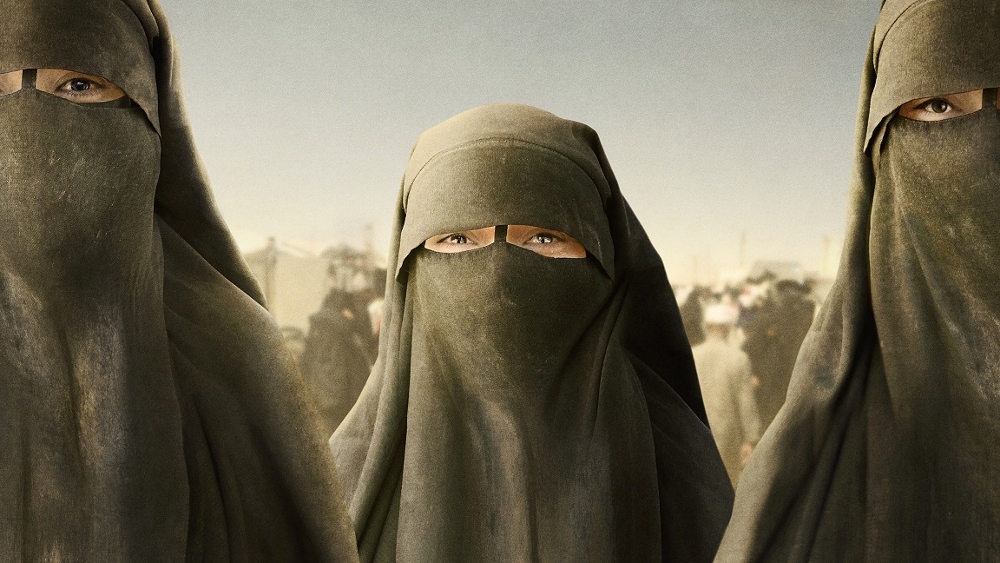
Suspenseful and harrowing, Sabaya is a documentary that evokes amazement and horror. The courage of its protagonists is inspiring, as time after time, they risk their lives to rescue Yazidi women and girls who had been kidnapped and enslaved by Daesh (ISIS). Swedish filmmaker Hogir Hirori (The Deminer, 2017) takes these risks along with them, as the camera documents their every move within the camp, and escaping from it. Their daring in attempting such a rescue is astounding, their success almost miraculous. A testament to the on-going, far-reaching ravages of war, Sabaya is also a testament to the bravery, resilience, and compassion of the human heart.
The Yazidis are an ethnic and religious minority living in the Sinjar District of Northern Iraq, practicing Yazidism, a monotheistic religion. Daesh is the Arabic acronym of ISIL (the Islamic State of Iraq and the Levant), also known as ISIS (the Islamic State of Iraq and Syria), officially known as the Islamic State. In 2014, Daesh captured Sinjar, killing many of the men and taking the women and children. These girls and women were forcibly converted to Islam and given as brides to Daesh soldiers, yet effectively they were held as sex slaves, the Arabic word for these sex slaves is Sabaya. Now, the Yazidi Home Center is working to locate these women and return them to their families. Although some of these Yadizi women may be in the Al-Hol camp, the camp also contains many members of Daesh and their supporters. With a population of about 73,000, finding individual women is a challenge in itself, finding them and extracting them from a hostile environment verges on the impossible.
The film focuses on Mahmud, a volunteer who, along with Ziyad, the Head of the Yadizi Home Center, is dedicated to rescuing the Yadizi women. These rescues are made possible by the courageous women, some of them former Sabaya, who infiltrate the camp to live among the refugee women there, locating the Yadizi women and communicating clandestinely with Mahmud. Clad in black niqab, it is perhaps easier for them to disappear among the multitudes in the camp, yet, finding the captive women is a difficult task, especially as they are usually working from photographs that are several years old. A greater obstacle is the presence of women who are Daesh supporters, and actively work to hide the Yadizi women and prevent their release.
Mahmud is constantly on the phone, talking to family members hoping to be reunited with their daughters and sisters, or receiving information and coordinating with the infiltrators within the camp. His wife, Siham, can’t help but comment that he is never home. Yet it is a family effort, for when the women are spirited out of the camp, Mahmud brings them home, where Siham and Zahra (Mahmud’s mother) care for them until they can be reunited with their families. The road to recovery is a long one. For years they have been tortured and raped, and lived under conditions of slavery. Some have lost their entire families, and are alone in the world. For others, who have born children to Daesh men, the return is a painful one, as the Yazidi community will not accept these children.
The loving care bestowed on the women by Siham and Zahra is heartwarming to view, and its healing effect on the women is moving. Even Mahmud and Siham’s little boy Shadi is part of the project, playing and talking with the women; they are like part of the family. One of my favorite scenes is when Zahra gathers up the black garments of the niqab that the women were forced to wear, lighting a bonfire to destroy them, and saying “let it burn.”
The viewer is immersed in the action throughout the film, the conversations, the tensions, and the daring operations within the camp. The identity of the female infiltrators is of necessity protected throughout, yet they are the heroes of these missions, constantly rising discovery within what is, in effect, the enemy’s camp. Although the Syrian Democratic Forces are officially in charge of the camp, they do not intervene in the camp’s internal affairs. Anything can happen, and it does. Hirori is there with his camera, and we experience the breath-taking tension with these brave humanitarians.
Sabaya will participate in the International Competition at Docaviv – the Tel Aviv International Documentary Festival that will take place from July 1 – 10, 2021. Tickets and additional information may be found on the Docaviv website: https://www.docaviv.co.il/2021-en/
Sabaya
Sweden/2021/91 min/Arabic and Kurdish with English and Hebrew subtitles
Director, Script, and Cinematography: Hogir Hirori; Research: Guevara Namer; Music: Mohammed Zaki





